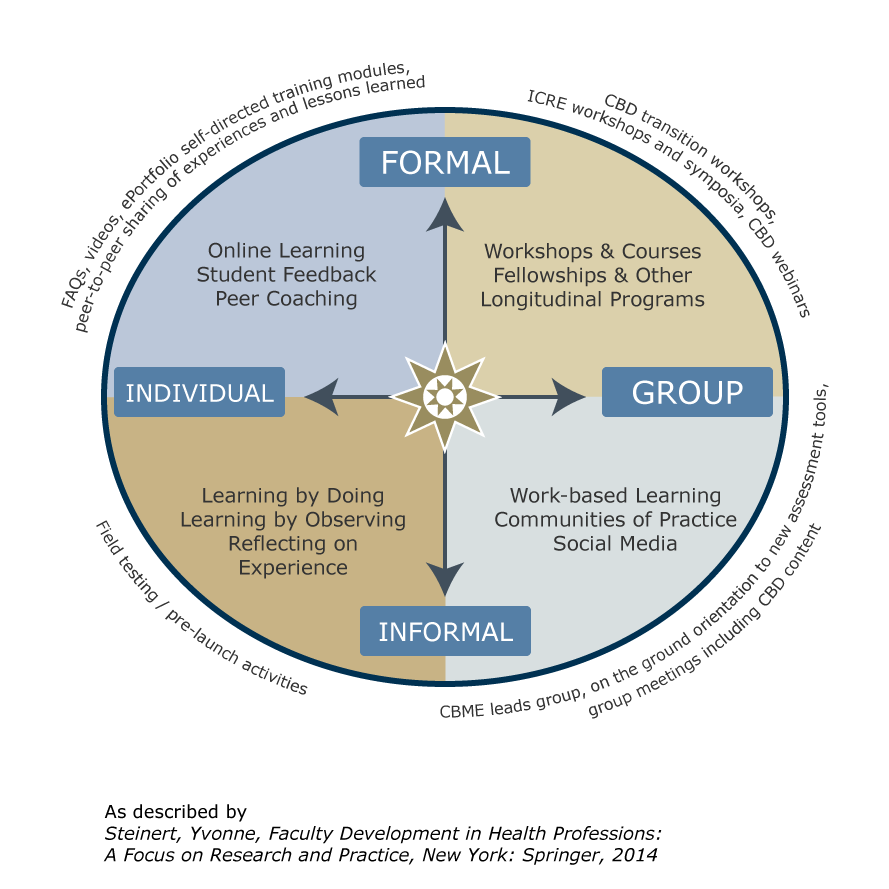Background on Faculty Development in CBD
As many of us know from experience, quality faculty development is essential to the success of major changes in medical education. This is due, in large part, to the fact that faculty first have to understand, design and engage in the change in order to later model and teach it.
Competence by Design (CBD) is one of the largest change initiatives in the history of Canadian medical education, which is why we’ve prioritized faculty engagement and development as a major component of the CBD initiative. We are pleased to say that there is a large and growing group of people across the country working together to create the kinds of educational resources and interventions that will support faculty to implement CBD.
Faculty development is a shared responsibility and commitment. The Royal College is working closely with faculties of medicine across the country to ensure that the learning needs of all stakeholders are both understood and supported. Every medical school in Canada has now identified a CBME Lead to help support local implementation of CBD and the Royal College is partnering with this dynamic group of educators to support and extend their local efforts.
Target Audiences
Given the grand scope of the change associated with CBD, there is a broad range of stakeholders with different learning needs. Each will benefit from targeted Faculty Development some of which will originate from the Royal College and some of it will originate locally. There is no one size fits all approach to how Competence by Design (CBD) will be implemented. Each program and faculty has its own opportunities, challenges, timeframe and local context. For this reason, we are committed to an iterative and thoughtful implementation approach, which enables co-creation and mutual learning with our partners and Fellows.
Depending on the needs of the audience and the opportunity for meaningful contact some of the faculty development originates with the Royal College; in other cases the support is developed and/or delivered locally within the schools. In some cases, and as much as possible, these local efforts are extended by Royal College templates and tools.
The Royal College and our partners acknowledge that one of the keys to efficient and effective faculty development and implementation support is to utilize established channels of contact to strategically support the change. Therefore, while Specialty committees (including Program Directors), CBME Leads and PGME Deans typically receive direct support from the Royal College; other university faculty (including but not limited to, clinical teachers, Program Administrators, Deans, Department Chairs, Division and Department heads), as well as residents, often work more directly with their local support teams.
A variety of approaches
Faculty, program administrators and residents are extremely busy, which is why the Royal College is committed to providing a range of faculty development activities and resources that people can ‘plug and play’ if and when they need them. Just-in-time faculty development is key to our strategy and to many of the other strategies being developed locally at each medical school in Canada. Faculty development for CBD involves more than just workshops. In keeping with good practice, we encourage a mix of formal, informal, individual and group learning.
Four components of faculty development

Featured faculty development activities and resources
Anyone navigating the Royal College’s website, and particularly the CBD pages, will find all kinds of initiatives, tools and resources designed to assist target audiences to effectively fulfil their multiple roles in a competency-based residency system. We encourage you to check out our Directory of CBD Resources, which centralizes these resources for your convenience.
Here is a sample of some of the many faculty development activities and resources that you may find helpful.
Transitioning to CBD
CBD Transition Workshops
Specialty committees, including program directors, have a unique CBD faculty development experience in that they typically attend 3 multi-day workshops at the Royal College over the course of approximately 2 years. In addition, they also receive support before, between and after these CBD workshops to help prepare them to influence change and learning in their programs including among their clinical colleagues, residents and program administrators.
Implementation of CBD
Competence committees
In CBD, a competence committee uses entrustable professional activities (EPAs) as a framework to determine when each resident has achieved the appropriate level of competence before moving to the next stage of their training. Review guidelines, fact sheets and videos that you can use to teach others about competence committees.
Work based assessment (WBA)
Teaching and assessment in CBD is focused on EPAs that we observe using work based assessment. Over time, multiple observations by multiple observers will provide a broader image of a trainee’s competence, and will eventually inform promotion decisions. Visit the CBD Directory to see these WBA resources.
Preparing your residents
Engaging and preparing residents for the shift to the new CBD system is very important. The Royal College has a number of resources that you can use and customize for your school or discipline. More resources are in development, and will be rolled-out throughout CBD implementation. Resident engagement resources.
The Royal College has a range of resources and tools to support your faculty development efforts. These resources are updated regularly. If you can’t find what you need, please contact us for help: cbd@royalcollege.ca.
At the local level, each school has a CBME Lead available to support the transition and implementation to CBD. We encourage you to contact your CBME Lead directly with any questions related to the local engagement of residents or faculty.
Resources
- Tools and resources
- CBME Leads Directory
- CanMEDS Interactive
- Understanding milestones and EPAs (Dialogue, February 2015)
We are here to help you succeed with CBD. Contact us:
cbd@royalcollege.ca
“We need assessment tools. We need support. We need faculty development. And I think we also need some patience. This is going to take a little bit of time.”
— J. Mark Walton, MD, FRCSC; assistant dean of Postgraduate Medical Education at McMaster University